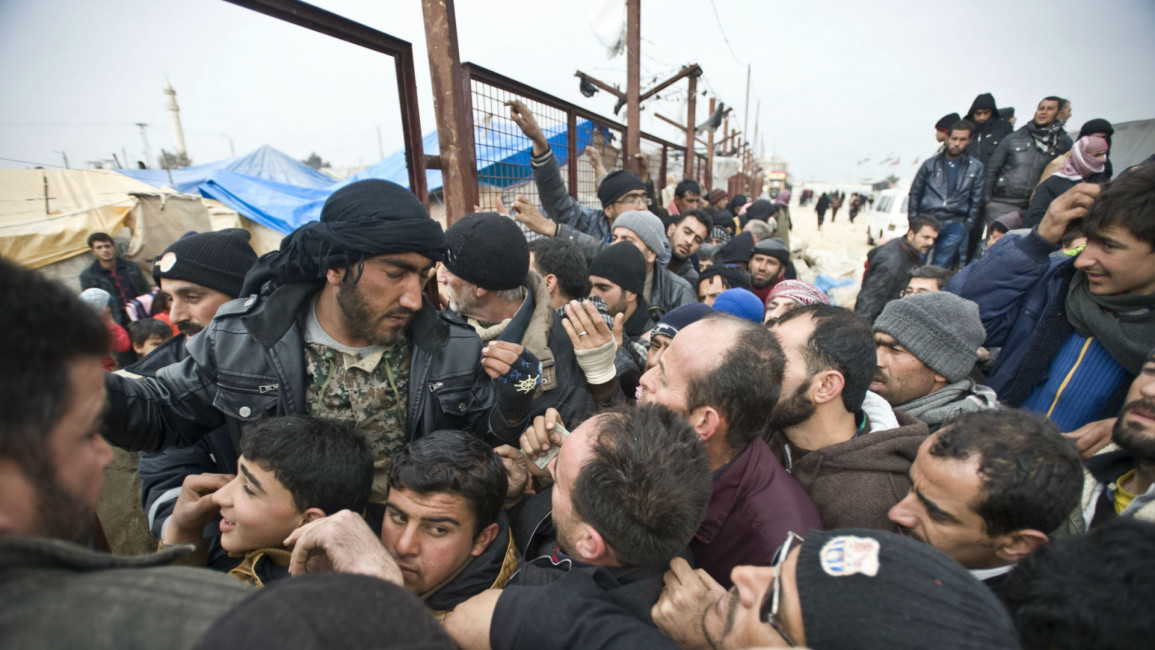
The future of Syrians in Lebanon
The future is closing for tens of thousands of Syrian children who don't have legal proof of their existence in Lebanon.
If their predicament isn't solved, they risk growing up stateless, which would prohibit them from accessing basic rights entitled to each person under international law.
Their families have already been torn away from their communities and loved ones. Most struggle to keep the possibility for a better future alive while confined to the margins of society.
The ensuing generation, however, will be tied to a life of perpetual anguish and despair. They are destined this way, unless the Lebanese government removes the legal barriers that dissuades displaced families from registering the birth of their children.
The social minister of Lebanon, Rashid Derrbas, seems to disagree. On February 25, he blamed Syrian families for failing to register the identity of their children. What he forgot to mention is that most don't have all of the required, and often impractical, legal documentation to do so.
An inaccessible legal framework
There are five main steps that each family has to complete to fully register their child in Lebanon. The first three are considered the most essential, since they have to be completed within the first year of the child's life.
Each family must receive a birth notification from the midwife or physician who delivered the baby before acquiring a birth certificate from the Moktar - the head authority figure of the village. One of the parents has to then travel to register these documents at the nearest local and foreign registry in the Personal Status Department (PSD).
While Syrians can visit the local registry without expecting major obstacles, visiting the foreign office is impossible for those who don’t have legal status in the country. It hasn't helped that the government has dissuaded hundreds of thousands of Syrians from legalising themselves since the beginning of 2015.
 |
No wonder so many families are having such a difficult time to register the identity of their children |  |
For starters, each Syrian national above 15 years of age must pay $200, show valid identification and sign a "housing pledge" that confirms where they live. Those registered with the United Nations' refugee agency (UNHCR) then have to sign a pledge "not to work" - while everyone else has to find a Lebanese employer to sponsor them.
No wonder so many families are having such a difficult time to register the identity of their children. Most aren't even able to legalise themselves.
Meanwhile, the Lebanese government is repeatedly shooting itself in the foot. It has insisted that Syrian refugees will not be permanently settled in Lebanon, since it risks tipping the fragile sectarian balance of the country.
But if they do not provide a pragmatic procedure for Syrians to legalise themselves and register the birth of their children, families risk not being able to return to their homeland with their children once the war is over.
Avoiding statelessness
Even those with legal status struggle to register the birth of their newborns.
According to a report released by the Norwegian Refugee Council last year, at least 14 percent of Syrian refugees couldn't provide the Moktar with any kind of proof of their marriage. Such a document is required to attain a birth certificate, which is vital for families to have any hope to register the birth of their children in the future.
The reality of war often forces thousands of refugees to escape armed conflict without the time to grab essential paperwork. The fact that local authorities across Lebanon sometimes ask for more legal papers than is required also doesn't help, and it clearly undermines any effort to adopt a standardised process.
Many refugees have consequently tried to smuggle their children back through conflict-ridden areas to register them in Syria. Many have also risked crossing back into the war to grab the necessary legal documents. This is a major risk since Lebanon prohibits Syrians from re-entering the country once they've left.
 |
There remains little indication that the government is willing to modify its policy |  |
While many of the obstacles dissuading birth registration remain complicated to manoeuvre around, the Lebanese government can do far more to alleviate the process. Recognising the UNHCR registration paper as a proof of marriage and residency would be a good first step, especially since nearly 80 percent of Syrians are registered with the agency.
For everybody else, the government should consider waving the $200 fee required to obtain legal status, while removing the condition of a sponsor to find employment. This would help families legalise themselves in order to register their children.
However, there remains little indication that the government is willing to modify its policy. But the consequences could be irreversible unless they do so immediately.
Children without proof of their identity are in danger of being trafficked, recruited to fight with militias, and never being allowed to enroll in school. It also dramatically increases the risk that they grow up without a nationality.
Such a fate would ensure that they fall through the cracks of history, if they haven't already done so.
Mat Nashed is a Lebanon-based journalist covering displacement and exile. Follow him on Twitter: @matnashed
Opinions expressed in this article remain those of the author and do not necessarily represent those of The New Arab, its editorial board or staff.




